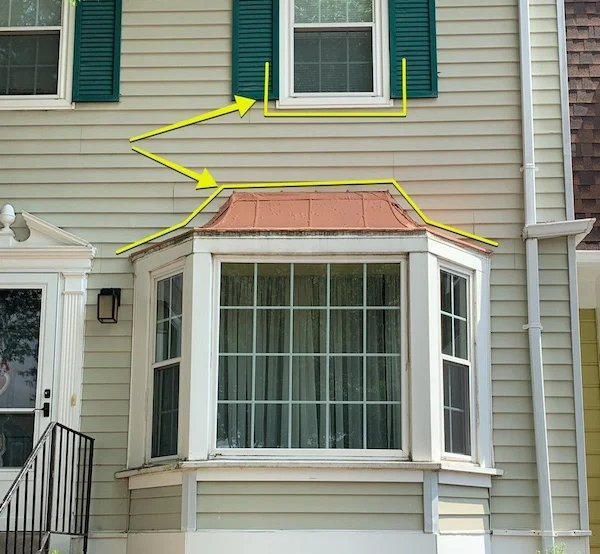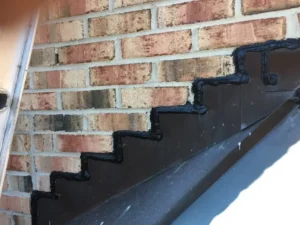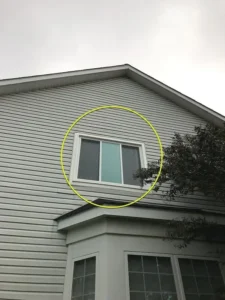Are you watching those water stains begin to grow on the ceiling inside your bay window? Maybe you can hear the occasional drip? There are few things homeowners dread more than a leaking roof!
Unfortunately, leaky bay windows are quite common (we’re guessing that hearing “you’re not alone!” isn’t exactly comforting, though). Because of the way a bay window’s roof line runs up to the side of the house, these types of windows require a very special way of connecting the roof to the side of your home. And, each part of the roof requires the appropriate flashing to ensure a tight seam where the materials join.
Uh oh… Is Your Bay Window Leaking?
Ready for some good news?
With the right roofing pro in your corner, your leak can be traced to its source and remediated. Or, better yet, working with the right roofer from the start can help avoid this issue altogether!
How To Identify The Source Of The Leak In Your Bay Window
Bay windows are a charming feature on any home, providing extra space, natural light, and a beautiful view. However, like all windows, bay windows are susceptible to leaks, leading to significant structural damage and unsightly water spots if not addressed promptly. But don’t worry, identifying the source of a leak in your bay window can be easier than you think.

Let’s Check The Flashing To Make Sure It Is Properly Sealed
The first potential source when dealing with a leaking bay window is the flashing. Flashing is a thin layer of waterproof material installed where the bay window meets the house to divert water away from the window. Incorrectly installed, old, or damaged flashing can allow water to seep through.
Start by inspecting the exterior of your bay window on a dry day. You’re looking for any visible signs of damage such as cracks, tears, gaps, or rust on metal flashing. Also, check whether the flashing has been correctly overlapped and sealed. If there are gaps or the sealant appears damaged, water could easily infiltrate these cracks.
During rainfall, you can also observe where the water flows on your window. If it appears to be flowing behind the flashing or pooling in certain areas, it might indicate that your flashing is not properly installed or sealed.
If the flashing appears damaged or improperly installed, it is recommended to call a professional to repair it. Flashing repair isn’t typically a DIY job since it requires specific knowledge and tools to be done correctly.
Want to learn more: How Professionals Repair And Prevent Future Issues with Bay Windows
SCHEDULE SERVICE NOW
Scheduling a repair is as easy as 1, 2, 3 with our new online scheduler. Book your appointment at a time that suits you, and relax knowing we’ll be there right on time, guaranteed.
Is The Leak Coming From The Top or Bottom Of Your Bay Window?
If the flashing appears intact, the next step is to determine whether the leak originates from the top or bottom of your bay window.
Top Leaks: If you notice dampness or stains on the ceiling or upper wall near your bay window during or after rainfall, the leak will likely come from the top of the window. This could be due to issues with the window’s sealant or a damaged roof above the window. Another possibility is the lack of an overhang or a poorly installed drip edge above the window, allowing water to drip directly onto the window, eventually causing leaks.
To address these issues, check the sealant around the top of the window for cracks or gaps and re-caulk if necessary. For roof-related issues or structural modifications like installing an overhang, it’s best to consult a professional.
Bottom Leaks: If the water appears at the bottom of the bay window, or if you notice dampness on the adjacent floor or lower wall, the leak may be coming from the bottom. This could be due to improper window installation, damaged sealant, or poor drainage. Again, check the sealant and re-caulk if necessary. If the window seems improperly installed or there are signs of rot or mold on the sill or the lower parts of the window, professional help should be sought.
Regardless of the source of the leak, quick action is crucial to prevent further damage to your bay window and your home. If the cause is not immediately evident or the repair seems beyond your skillset, don’t hesitate to contact a home exteriors company. Window leaks can lead to serious structural damage if left unattended, so it’s always best to be safe rather than sorry.
We Can Perform a Water Test, If Necessary
RoofPRO offers top-rated leak repair and replacement services in the Maryland area, give us a call for a free professional inspection.
To help you be certain that the issue was addressed after repairing a particularly problematic window, we can perform a water test. With one of our technicians inside the house looking for signs of water, another technician will spray your bay window, flashing, brick, and the windows above with a hose. Think of it as a controlled rainstorm!
This is rarely necessary, but it offers the absolute assurance that we corrected the weak point and that your bay window will no longer leak.
Avoiding a Leaky Bay Window When Your Home Has Wood Or Vinyl Siding
When the house is covered in wood or vinyl siding, it’s crucial to have step flashing and apron flashing tucked up behind the siding to create a totally effective seal against moisture intrusion. It’s also important to ensure that the apron flashing overlaps the step flashing and that the corners are sealed. When we are called to fix a leaky bay window, one of the first steps we take is to check for any damage to the step flashing or apron flashing.
And, we also inspect the installation’s quality to see if everything was done correctly.
Making Sure Your Bay Window Connects Perfectly with Brick Siding
So, what do you do if you have brick siding, since that doesn’t overlap with your flashing as easily?
The concept is much the same, only this time we create custom-bent counter flashing. Here is a quick look at the steps involved:
- First, we take measurements of every angle we need
- We then cut and bend the metal for your new flashing
- Next, we use a grinder to cut a small gap into the mortar which allows us to tuck the counter flashing right inside, joining snugly
- The counter flashing is then nailed to the mortar
- Finally, we finish it off with a bead of silicone roofing sealant along the top edge of the counter flashing where it meets the brick
Issues with your counter flashing are normally the number one reason why a bay window can leak. Often due to the age of the house, the original roofing sealant will break down and start to crack and fall apart. In some cases, the sealant will have been installed poorly, leaving gaps for water to get through the flashing. This is again one of the first things we inspect when we arrive on the scene.
Another Common Culprit? The Windows Above Your Bay Window!
After we’ve inspected all of the roofing material and flashing around the bay window, the next step is to look up. An unfortunate domino effect can be created if the window above isn’t functioning as it should.
Here are a few of the common problem areas we’ll check:
- For homes with siding, we’ll check the flashing behind the siding to make sure it was installed correctly and is functioning as it needs to
- We’ll check for any missing flashing around the window, or any sections that were not installed well
- If it is a brick home, we inspect the caulking around the edge of the window (after a few years, depending on the condition of the exterior roofing caulk, there might be cracking or age-induced decay)
- The window itself could also be leaking if the drain holes are clogged
- Sometimes the window is just old, and no longer able to keep out the weather
- Cracking bricks above the window can also allow water inside
If you still haven’t identified the root of your issue, you can find more common causes of bay window leaks here.
Working with the Right Roofing Company Inspires Confidence
Leaks are stressful, making it essential that you work with a professional roofing company who has the knowledge, skills, and experience needed to pinpoint and correct any weaknesses in your roof system.
Here at RoofPRO, we are confident that we can address even your most elusive leaks, offering the very best solution to provide priceless peace of mind. We roof it right, the first time!
Article Updated May 19, 2023.






